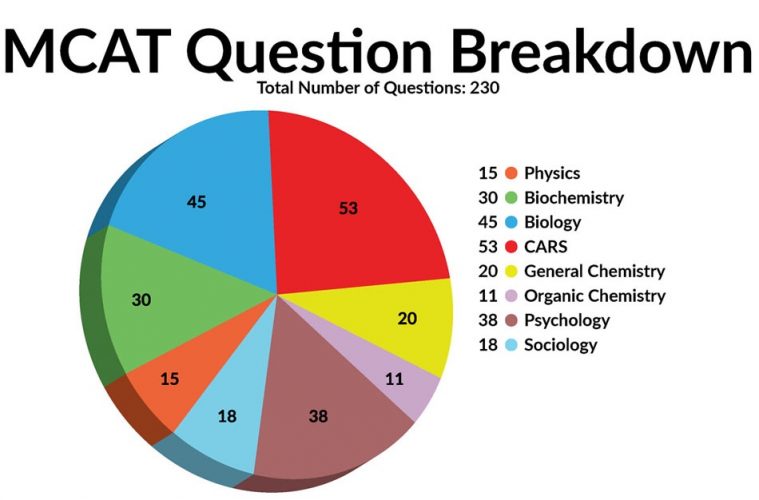MCAT Sections & Subjects
The MCAT-2015 (the most recent version of the test created by the AAMC) is comprised of 4 sections. Below is an outline of each of the sections you will be tested on and some of the subjects and subtopics that you should make sure you know for test day. In the first three sections, you should expect questions that test your scientific reasoning and inquiry skills, whereas, in the CARS section of the exam, you should prepare for questions that will assess your analysis and reasoning skills in a much wider range of topics beyond the realm of science.
Biological and Biochemical Foundations of Living Systems
This section is designed to test you in the areas of biology, organic and inorganic chemistry, biochemistry, and cellular and molecular biology. For areas such as biology and organic and inorganic chemistry, you are only expected to know up to an “introductory level”, whereas the remaining few topics such as biochemistry and cellular and molecular biology will likely test you on concepts that you will learn within your first semester in university or college. This section also tests your knowledge of research methods and statistics concepts and your ability to apply these areas to the natural sciences.
There are 59 questions in this section of the exam, and you will have 95 minutes to complete it. The questions you will find in this section are a mix of discrete questions and passage-based questions. According to the AAMC, the approximate percentage breakdown of each of the subjects in the section (approximated to the nearest 5%) is 65% introductory biology, 25% first-semester biochemistry, 5% general chemistry, and 5% organic chemistry.
Chemical and Physical Foundations of Biological Systems
The Chemical and Physical Foundations section of the exam tests your knowledge on the various functions of the human body (organs and tissues), ranging from mechanical to biochemical to physical. You will need to know the foundations and principles of biochemistry, molecular biology, biology, physics, organic and inorganic chemistry. As in sections 1 and 3, this section requires you to show and apply your skills of research methods, statistics, and scientific inquiry and reasoning.
There are 59 questions in this section and you will have 95 minutes to complete it. It is a mixture of discrete and passage-based questions, and for this section of the exam, you will be allowed to use a periodic table. The AAMC approximates the discipline breakdown of this section to be 30% general chemistry, 25% first-semester biochemistry, 25% introductory physics, 15% organic chemistry, and 5% introductory biology.
Psychological, Social, and Biological Foundations of Behavior
This section tests your foundational knowledge and ability to reason the fields of human and social issues, both areas that you are likely to encounter when you enter the world of medicine. To do well on this section, you will have to know concepts in the areas of psychology, sociology, and biology, as well as be aware of how concepts within these areas relate to the world and individual well-being. You will also be tested on your knowledge of research methods and statistics concepts.
Similar to the first two sections of the exam, this section contains 59 questions and you are given 95 minutes to complete it. The questions are a combination of discrete and passage-based. The approximate breakdown in terms of discipline, according to the AAMC, is 65% introductory psychology (includes biology-relevant psychology questions), 30% sociology, and 5% biology.
Critical Analysis and Reasoning Skills
The Critical Analysis and Reasoning Skills section, also known as CARS, is a unique part of the exam because, unlike the other three sections, it does not test your direct scientific knowledge. Instead, it tests your ability to read and understand complex passages that are related to social sciences and the humanities. Many people compare the CARS section of the MCAT to a standard verbal reasoning exam you have probably taken at some point in your academic life. Each passage you will encounter is usually between 500 and 600 words, however, do not mistake their short length for being easy! These passages will contain complicated language and will have a varied range of writing styles. Unlike the other sections of the MCAT, you do NOT need to study any outside topics or information to score well on this section; everything that you will need to know will be on the page in front of you!
The breakdown between the two topics, social sciences and humanities, is roughly 50% for each. This section, unlike the other three, only contains 53 questions that are all passage-based, and you will have 90 minutes to complete it.
